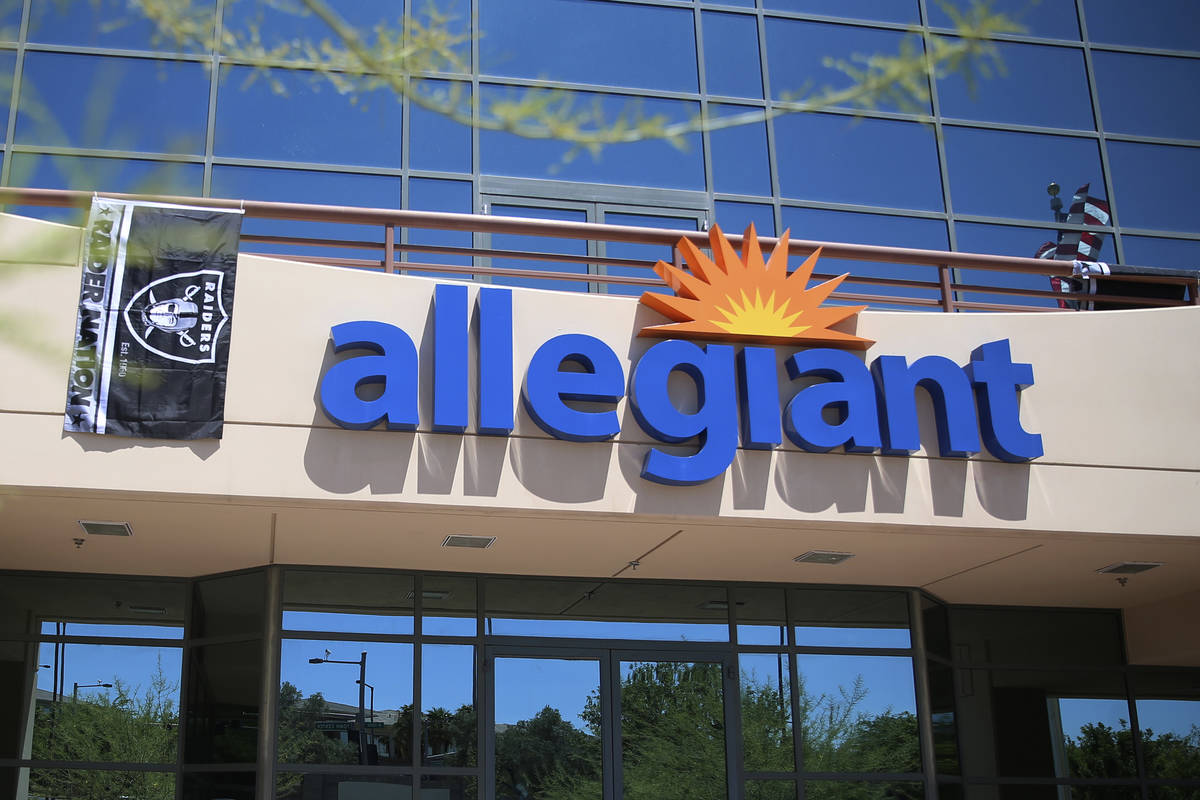Allegiant CFO says airline weathering COVID-19 travel disruptions

Though the airline industry has taken a massive hit during the COVID-19 pandemic, Las Vegas-based Allegiant Air believes it is poised to weather the storm as well as any airline.
Allegiant Chief Financial Officer Greg Anderson said the industry won’t see a return to full passenger loads until there is a widely distributed coronavirus vaccine. But he said Allegiant’s business model sets it up to see less impact than the major players in air travel.
In a phone interview, Anderson said of the three pillars of travel — international travel, business travel and leisure travel — Allegiant focuses on the one seeing the highest return in passenger volume.
“We focus 100 percent on domestic, 100 percent leisure, so we’re in a relatively well position,” he said. “Our biggest advantage is our business model. We’re a low-cost utilization model. We can keep our costs down better than any other airline by flying less.”
Most airlines, he said, need to fly a lot to pay for their aircraft. Allegiant’s advantage is it paid “roughly half what other airlines pay for their aircrafts.”
Company impacts
That flexibility allowed Allegiant to reduce its cash burn early on and see a return to cash coming in once state lockdowns lifted.
“We were better able to keep a wide-selling footprint intact throughout the crisis, so had a lot more cash relative to our size coming in the door than some of our peers,” he said.
Allegiant reported it saw a daily cash burn of $1.3 million in the third quarter, with over $2 million in gross bookings per day. Anderson said he expects the airline to see a daily cash burn in the fourth quarter of less than $1 million, based on the $2 million in daily gross bookings.
In comparison, Delta Air Lines announced Tuesday it saw an average $24 million daily cash burn during the third quarter.
Despite seeing smaller losses than larger airlines, Allegiant wasn’t immune to layoffs and furloughs. It eliminated 270 positions, including 137 staffed positions this month. Additionally, 275 pilots were alerted to potential furloughs.
Anderson doesn’t foresee additional reductions in staffing moving forward.
“We don’t expect any additional layoffs,” Anderson said. “It’s obviously a really tough situation, and unfortunately without any clarity on the extension of the CARES Act, we felt the prudent and right thing to do was reduce our corporate workforce.”
Allegiant did work out a deal with its flight attendants to avoid involuntary furloughs.
With no such deal in place for pilots, the first 100 pilots were furloughed Oct. 1, with 100 more notified their furloughs will be enacted later this month, Anderson said.
If another round of federal funding was approved, Allegiant would be able to bring back those furloughed sooner than if one is not approved.
Allegiant sold $150 million in senior notes late last month, which Anderson likened to an insurance policy, with it unclear that another stimulus package would be approved.
“We weren’t sure what the landscape was going to look like, so we have that in the bank,” Anderson said. “If this (federal funding) were passed it would be helpful of course, but we’re not planning on it.”
Las Vegas impacts
Anderson said Allegiant saw some initial demand for travel to Las Vegas as resorts began to reopen June 4. More demand will follow as more spaces in the city open, he added.
Allegiant offers bundled packages with hotels and is partnering with MGM Resorts International on its “Work From Vegas” program, which invites out-of-market workers to come to Las Vegas and essentially “work from home” from a hotel on the Strip.
“Really trying to bring in some leisure customers and tourists into Las Vegas, especially when we have limited conventions happening during this time,” Anderson said.
One unusual travel trend Anderson has seen is flights originating from Las Vegas to markets that are not usually seen as outbound destinations.
“We’ve seen a lot of outbound (traffic) from Vegas into some of our smaller destinations, which are typically originating destinations, such as cities in Montana or Idaho Falls,” Anderson said. “What we’re seeing is a lot of people leaving Vegas to spend time up there outdoors in areas like that.”
Sports sponsorships
Despite having potentially tens of millions of dollars tied to sports sponsorship each year, Anderson said those partnerships aren’t in danger of being ended. In fact, he sees those deals, like the airline’s founding sponsorship of Allegiant Stadium with the Raiders, as beneficial to getting things back on track.
“With the stadium, that’s by far our largest sponsorship with the Raiders … and the Raiders have been terrific partners from the onset of the pandemic; they’ve just worked with us,” Anderson said. “They knew the airlines were in a difficult place, so they’ve worked with us tremendously throughout this.”
Despite the Raiders and Allegiant Stadium sponsorships and other deals with the Golden Knights, minor league baseball and others in place, Anderson said their marketing spend is actually down compared with last year.
Since the stadium naming rights deal was announced, Allegiant has seen 80 billion impressions online, with 8 billion of those coming the week of and the day of the “Monday Night Football” debut of the stadium and the Raiders in Las Vegas.
“We’ve really mitigated that traditional marketing spend and really put it into the stadium,” Anderson said. “Gross marketing spend we’re actually down year over year meaningfully. We’ve been more data driven with our marketing. The stadium has been a terrific brand awareness for Allegiant.
“Throughout the U.S. and even the world, I get comments all the time about how great the stadium looks and about Allegiant. We’re still really happy about the outcome there.”
Contact Mick Akers at makers@reviewjournal.com or 702-387-2920. Follow @mickakers on Twitter.